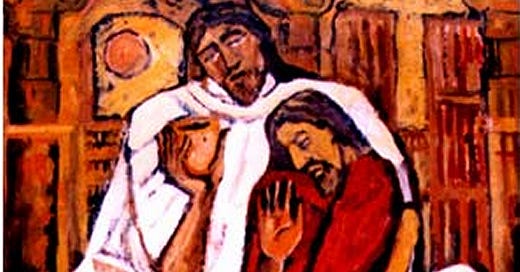Recall that the Hebrew word “mitzvah” (מִצְוָה), often translated as “commandment,” derives its basic idea regarding connection to God (i.e., the root צוה means to “bind” or “unite”). Therefore when Yeshua said to his followers, “If you love me, keep my commandments” (John 14:15; 1 John 5:3), he meant they should do those things that connect them with him (John 15:1-5). The appeal to “love the Lord your God” (וְאָהַבְתָּ אֵת יְהוָה אֱלֹהֶיךָ) with all your heart was also the message the Lord gave to Israel at Sinai (Exod. 20:6; Deut. 6:5). What is essential to Torah, then, is a love connection, that is, walking in the light of the Lord and knowing the blessing of his heart...
We told to have the “mind of Messiah” (תּוֹדָעָת הַמָּשִׁיחַ) within us -- that is, we are to embrace his hashkafah (הַשׁקָפָה), or his outlook, and his chashivah (חֲשִׁיבָה), or thinking, regarding the truth and reason for our lives (1 Cor. 2:16). This means knowing the heart of the Father as lived and expressed in the life of his beloved Son (בן יחיד). "This is eternal life, that they know you the only true God, and Yeshua the Messiah whom you have sent" (John 17:3). Yeshua is the interpreter and teacher of Torah (המורה הגדול ביותר), and all the great truths of Scripture point to him: “I the Lord, have called you in righteousness, and will hold your hand; I will keep you and give you as a covenant to the people, as a light to the Gentiles, to open blind eyes, to rescue prisoners from prison, and those who sit in darkness” (Isa. 42:6-7).
The Holy Scriptures (כִּתְבֵי הַקּוֹדֵשׁ) - both the “Tanakh” (i.e., תנ"ך, an acronym for Torah (תּוּרה), Prophets (נביאים), and Writings (כּתּוּבים)) as well as New Testament (i.e., הַבְּרִית הַחֲדָשָׁה, including the Gospels, the Writings (epistles), and the book of Revelation) provide witness as informed by the Holy Spirit (Tim. 3:16-17). When we read the Scriptures with a heart of faith, the Holy Spirit (רוּחַ הַקּוֹדֵשׁ), whom Yeshua called “the Spirit of Truth” (רוּחַ הָאֱמֶת), provides the “seal” of attestation and the inner witness between our minds and the mind of our Lord (John 15:26, 1 Cor. 2:16; Phil. 2:5). The “yoke” of Yeshua’s discipleship leads us to know his ways and to shepherd our understanding of God (Matt. 11:29).
Discipleship to Messiah is more than simply “book learning,” of course, since the Word of God is “living and powerful, sharper than any two-edged sword, piercing even to the division of soul and spirit (הַנֶפֶשׁ וְהָרוּחַ), and of joints and marrow (הַמִפְרָקִים וְהַמֹחַ), and is the judge (הבּוֹחֵן) of the thoughts and intentions of the heart (Heb. 4:12). In other words, “study” is a means to the greater end of living the truth in your daily life. Followers of Yeshua are to be “doers of the word” (עוֹשֵׂי הַדָּבָר) and not merely “hearers” who fool themselves (James 1:22). As Yeshua said, “Whoever has my commandments and keeps them, he it is who loves me. And he who loves me will be loved by my Father, and I will love him and manifest (i.e., “shine within,” from ἐν, “in” + φαίνω, “shine”) myself to him” (John 14:21). The end or goal of Torah is personal love for God revealed by the inner light of our Redeemer and Savior.
As we study the Scriptures, then, let us obey from the heart its “Torah,” its living message of grace and love spoken to us... The “mind of Christ” (i.e., תּוֹדָעָת הַמָּשִׁיחַ), that is, Yeshua’s beliefs, values, concerns, and vision then become our own. When we identify and and yield ourselves to him, we become instruments of his will, practicing peace, love, and good will toward others in his name. As we “follow” him, we share the same way, truth, and life that revealed the heart of the Father: “Let this attitude be in you” that was also in Yeshua the Messiah... who humbled himself and became obedient unto death - even the death upon the cross (Phil. 2:5-8; John 15:13).
Yeshua promised that the Ruach HaKodesh (Holy Spirit) would be “called alongside” (παράκλητος) to comfort us on the journey. The English verb “comfort” literally means “to give strength” (from com- [“with”] and fortis [“strong”]), an idea similarly expressed by the verb “encourage,” that is, to “put heart [i.e., ‘core’] within the soul.” In Hebrew, the word courage is expressed by the phrase ometz lev (אמֶץ לֵב), meaning “strong of heart,” denoting an inner quality of the will rather than of the intellect. Ometz lev means having an inner resolve, a passion, and a direction. The sages say “the mind is the eye, whereas the heart is the feet.” May the LORD our God be our Light and Salvation as we walk through the surrounding darkness...
Let us always focus on Yeshua, “the Light of Torah” (האור של תורה) and “the true Wisdom of God” (חָכְמַת אֱלהִים אֲמִתִי). He is the Source of the Light we need that overcomes all darkness; He is the Power that is upholds our way. Yeshua is the Beginning, the Center, and the End of all true meaning from God. Blessed is His Name forever and ever. Amen.
Psalm 36:10
מְשֹׁךְ חַסְדְּ֞ךָ לְיֹדְעֶ֫יךָ
וְצִדְקָתְ֞ךָ לְיִשְׁרֵי־לֵב׃
”O continue your lovingkindness
to those who know you,
and your righteousness
to the upright in heart.”





Beautiful reminder about the mind of Christ. There’s so much here to soak up that I’ve already read it twice! Thanks for ministering to my heart this Saturday morning.
Great article. I especially liked the part about having 'the mind of Messiah.'